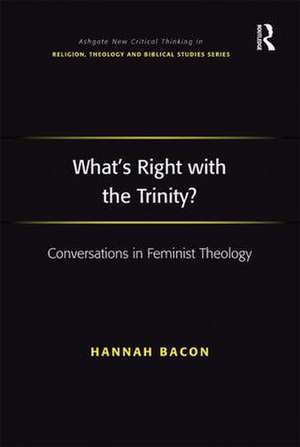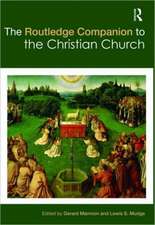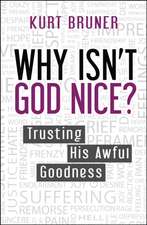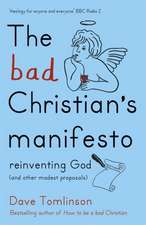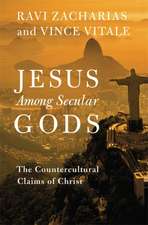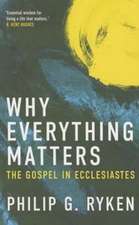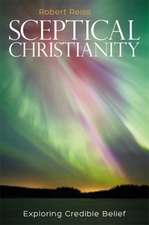What's Right with the Trinity?: Conversations in Feminist Theology: Routledge New Critical Thinking in Religion, Theology and Biblical Studies
Autor Hannah Baconen Limba Engleză Hardback – 18 dec 2009
| Toate formatele și edițiile | Preț | Express |
|---|---|---|
| Paperback (1) | 384.86 lei 6-8 săpt. | |
| Taylor & Francis – 30 sep 2021 | 384.86 lei 6-8 săpt. | |
| Hardback (1) | 1059.45 lei 6-8 săpt. | |
| Taylor & Francis – 18 dec 2009 | 1059.45 lei 6-8 săpt. |
Din seria Routledge New Critical Thinking in Religion, Theology and Biblical Studies
-
 Preț: 295.00 lei
Preț: 295.00 lei -
 Preț: 310.22 lei
Preț: 310.22 lei -
 Preț: 326.73 lei
Preț: 326.73 lei -
 Preț: 311.41 lei
Preț: 311.41 lei -
 Preț: 302.06 lei
Preț: 302.06 lei -
 Preț: 313.38 lei
Preț: 313.38 lei -
 Preț: 310.80 lei
Preț: 310.80 lei -
 Preț: 293.81 lei
Preț: 293.81 lei -
 Preț: 326.55 lei
Preț: 326.55 lei -
 Preț: 309.23 lei
Preț: 309.23 lei -
 Preț: 311.59 lei
Preț: 311.59 lei -
 Preț: 324.89 lei
Preț: 324.89 lei -
 Preț: 340.66 lei
Preț: 340.66 lei -
 Preț: 311.03 lei
Preț: 311.03 lei -
 Preț: 311.41 lei
Preț: 311.41 lei -
 Preț: 401.91 lei
Preț: 401.91 lei - 28%
 Preț: 820.71 lei
Preț: 820.71 lei - 26%
 Preț: 764.69 lei
Preț: 764.69 lei - 18%
 Preț: 1059.45 lei
Preț: 1059.45 lei - 18%
 Preț: 1054.71 lei
Preț: 1054.71 lei - 18%
 Preț: 1054.71 lei
Preț: 1054.71 lei - 28%
 Preț: 823.34 lei
Preț: 823.34 lei - 18%
 Preț: 1054.71 lei
Preț: 1054.71 lei - 18%
 Preț: 1058.79 lei
Preț: 1058.79 lei - 18%
 Preț: 1054.71 lei
Preț: 1054.71 lei - 18%
 Preț: 1057.09 lei
Preț: 1057.09 lei - 18%
 Preț: 1055.51 lei
Preț: 1055.51 lei - 20%
 Preț: 191.60 lei
Preț: 191.60 lei - 18%
 Preț: 1056.28 lei
Preț: 1056.28 lei - 18%
 Preț: 700.75 lei
Preț: 700.75 lei - 18%
 Preț: 1054.71 lei
Preț: 1054.71 lei - 25%
 Preț: 767.07 lei
Preț: 767.07 lei - 26%
 Preț: 877.59 lei
Preț: 877.59 lei - 18%
 Preț: 1054.71 lei
Preț: 1054.71 lei - 18%
 Preț: 1057.89 lei
Preț: 1057.89 lei - 31%
 Preț: 765.40 lei
Preț: 765.40 lei - 18%
 Preț: 1054.71 lei
Preț: 1054.71 lei - 18%
 Preț: 1000.27 lei
Preț: 1000.27 lei - 30%
 Preț: 850.17 lei
Preț: 850.17 lei - 18%
 Preț: 1060.25 lei
Preț: 1060.25 lei - 18%
 Preț: 1059.45 lei
Preț: 1059.45 lei - 18%
 Preț: 1000.27 lei
Preț: 1000.27 lei - 18%
 Preț: 1000.27 lei
Preț: 1000.27 lei - 18%
 Preț: 1054.71 lei
Preț: 1054.71 lei - 18%
 Preț: 1108.37 lei
Preț: 1108.37 lei - 26%
 Preț: 821.13 lei
Preț: 821.13 lei - 26%
 Preț: 820.32 lei
Preț: 820.32 lei - 18%
 Preț: 1054.71 lei
Preț: 1054.71 lei - 18%
 Preț: 1053.79 lei
Preț: 1053.79 lei
Preț: 1059.45 lei
Preț vechi: 1292.01 lei
-18% Nou
Puncte Express: 1589
Preț estimativ în valută:
202.72€ • 211.66$ • 167.78£
202.72€ • 211.66$ • 167.78£
Carte tipărită la comandă
Livrare economică 04-18 aprilie
Preluare comenzi: 021 569.72.76
Specificații
ISBN-13: 9780754666738
ISBN-10: 0754666735
Pagini: 236
Dimensiuni: 156 x 234 x 14 mm
Greutate: 0.59 kg
Ediția:New.
Editura: Taylor & Francis
Colecția Routledge
Seria Routledge New Critical Thinking in Religion, Theology and Biblical Studies
Locul publicării:Oxford, United Kingdom
ISBN-10: 0754666735
Pagini: 236
Dimensiuni: 156 x 234 x 14 mm
Greutate: 0.59 kg
Ediția:New.
Editura: Taylor & Francis
Colecția Routledge
Seria Routledge New Critical Thinking in Religion, Theology and Biblical Studies
Locul publicării:Oxford, United Kingdom
Cuprins
Contents: Introduction: thinking and speaking rightly about God; Part I Thinking the Trinity: What's wrong with the Trinity? A feminist critique; Thinking God as trinity. Part II Feminist Theological Methodology: Working towards an orthodox-contextual theological methodology: a dialogue with Karl Barth and Friedrich Schleiermacher; From 'experience' to 'women's experience': towards a feminist theological methodology; From women's experience to 'speaking (as) woman: Lucy Irigaray and Parler-Femme. Part III Thinking the Trinity in Light of Feminist Theological Methodology: This God which is not One: Thinking the Trinity in light of Feminist Theological Methodology; Conclusion: what's right with the Trinity?' Bibliography; Index.
Notă biografică
Dr Hannah Bacon, Senior Lecturer in Theology and Religious Studies, University of Chester, UK
Recenzii
'Hannah Bacon furthers an important step in contemporary feminist theology: the recovery of an orthodox doctrine of the trinity. She shows with clarity and good sense what's wrong with some strands of trinitarian theology, and more importantly, what's right in other traditions of trinitarian theology - drawing upon a range of theological and non-theological sources. And what's right is that the truth of God's self-giving enhances certain feminist values of difference and subjectivity, values that liberate both women and men from idolatry and generate love for other. Bacon's work is timely, provocative and a fine example of constructive theology.' Gavin D'Costa, University of Bristol, UK 'In this scholarly and closely argued text, Hannah Bacon makes a significant contribution to Christian feminist debate about the Trinity. Seeking to steer a middle way between a closed orthodoxy on the one hand and post-Christian feminism on the other, between essentialist views of gender and post-modern fragmentation of the self, she argues for a 'generous orthodoxy' in which God's subjectivity and difference are the ground of women's identity, freedom and capacity for mutual relations. Her argument engages with secular and religious feminist theory, with representatives of modern theology and with classic orthodoxy, demonstrating an impressive knowledge of her sources. This book deserves to be taken seriously by all those seeking a deeper grasp of Christian feminist theology - as well as by those who remain to be convinced of the legitimacy of such a position.' Nicola Slee, Queen's Foundation for Ecumenical Theological Education, UK 'This important and timely study not only "reclaims" the doctrine of the Trinity from a feminist perspective, but shows how a trinitarian understanding of God can be enriched by feminist frameworks. It does this by encouraging a focus on the "grammar" of the Trinity, rather than on debates revolving around inclusive language; thus, it creat
Descriere
The doctrine of the Trinity poses a series of problems for feminist theology. At a basic level, the androcentric nature of Trinitarian language serves to promote the male as more fully in the image of God and as the archetype of humanity, pushing women to the margins of personhood. It is no surprise then that feminist scholarship on this doctrine has often focused on what's wrong with the Trinity, setting out the problems raised by the use of traditional androcentric Trinitarian language. This book brings together a discussion of feminist theological methodology with a critical exploration of the doctrine of the Trinity. Focussing on what's right with the Trinity as opposed to what's wrong with the Trinity, it considers the usefulness of this doctrine for feminist theology today. It replaces a stress on Trinitarian language with an emphasis on Trinitarian thought, exploring how we might effectively think rather than speak God in light of feminist concerns. In particular, it asks how a Trinitarian understanding of God might support, and be supported by, key values which underpin a feminist way of doing theology, specifically values which underpin the methodological use of women's experience in feminist theology. The central argument is that thinking God as Trinity need not serve to reinforce patriarchal values and ideals but may in fact promote the subjectivity and personhood of women.
